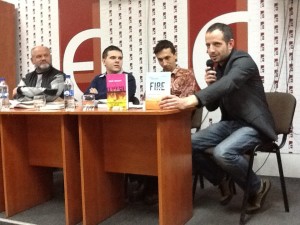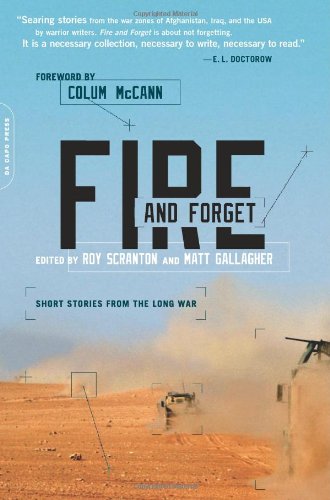I’m very excited to have one of my Homefires narratives featured on a literary website closely association with New Hampshire’s Free State Project — NHNovella.com.
 I’m also eagerly anticipating the release of Fire and Forget: Short Stories from the Long War next month. It’s a collaboration of fifteen recent veterans.
I’m also eagerly anticipating the release of Fire and Forget: Short Stories from the Long War next month. It’s a collaboration of fifteen recent veterans.
Here’s an excerpt from Nathan Webster’s Amazon.com review:
“At some point there will be a definitive novel-length account of the Iraq or Afghanistan war. There have been a couple good ones, but none that tell (or try to) the whole story – there are too many experiences, perspectives and points of view for one book, with one voice, to accomplish all that. At least for now.
This short story collection pulls off that difficult task: it ‘collects’ 15 unique voices, each with their own perspectives. In these short forms, taken as a whole, it does give the reader almost all the viewpoints of a soldier and veteran’s experience. While each story might not be perfect (and there were a couple I didn’t like), the entire book adds up to a greater sum than its individual parts.
I have my favorites – “Television” by Roman Skaskiw presents an excellent day-in-the-life description of the grinding days of little obvious reward, when the “mission” isn’t what a soldier expects or wants. “And Bugs Don’t Bleed” by Matt Gallagher is a look at the homefront divide between compassion and rage. Siobhan Fallon’s “Tips For a Smooth Transition” is an accurate look at an awkward reunion between a returning soldier and his wife. Phil Klay’s “Redeployment” is a story of a man and his dog.
. . . .
But the audience should be civilian readers who are looking for a fuller view of the war than a nonfiction “combat” story can really tell. It’s a success of this collection that only one story, Brian Turner’s “The Wave That Takes Them Under” really describes combat, and it’s so poetic I barely noticed. A soldier’s experience is much more than combat; these stories show a lot of the human feeling that gets missed behind pictures of guys all turtled-up behind body armor and black sunglasses.
It’s a powerful collection; for now, probably the best, most comprehensive – fictional – look at the wars that has been written. As I said, the individual stories might have their own flaws and some are better than others – but the sum is much greater than the parts.”
Blurbs:
The range of stories in Fire and Forget displays a remarkable depth and breadth of the experience of the Iraq war.
– Paul Harris, The Guardian
Captures the messiness of soldiering when the mission and endgame are unclear. Though fiction, each work reads true, filled with tension, fear, and anger.
– Booklist
Searing stories from the war zones of Afghanistan, Iraq, and the USA by warrior writers. Fire and Forget is about not forgetting. It is a necessary collection, necessary to write, necessary to read.
– E.L. Doctorow
I’ve been waiting for this book for a decade. I laughed, shouted, and cried while reading this kaleidoscopic collection. So many facets of war and the people who do our fighting are covered here. Fire and Forget is a literary history of this latest period of American wars. It’s a profound and telling work of art.
– Anthony Swofford
From Siobhan Fallon’s moving anatomy of what a waiting spouse has to look forward to after her husband’s third deployment, to Brian Van Reet’s brilliant gloss on Hemingway’s “Big Two-Hearted River,” these stories mark the territory of Return, in a manner both rich and essential.
– Anthony Giardina
A diverse anthology on our long wars in Iraq and Afghanistan united by the extraordinary talents of its authors. These stories are exceptional.
– Kevin Powers
A resonant, moving collection of stories from writers who know firsthand about the incongruous beauty and constant tragedy of war.
– Nathaniel Fick
***
Review by Jeff Price: “In the recent anthology of fiction, Fire and Forget: Short Stories from the Long War (edited by Matt Gallagher and Roy Scranton), Roman Skaskiw’s short story, “Television,” stands out among a varied set. Skaskiw renders what may or may not be an average sequence of days for an army platoon in Iraq as a Lieutenant Sugar is tasked with sorting out the aftermath of an Iraqi child’s shooting following the detonation of an IED on an army convoy. The blast “demolished a windshield and rang eardrums, but there was no follow-up ambush, there were no secondary IEDs, and it was just a single blast between trucks “not a daisy chain of detonations. No one was hurt, just a local kid they shot.” The sharp final clause, “just a local kid they shot” captures the general sentiment within this clutch of US troops, whose lives are guided by orders first, and looking after each other second. Yet, as do the masters of subtle fiction” Chekov, Babel, Didion — Skaskiw freights the clause in such a way that his story lives in contradiction to it: medics break from watching a DVD to treat the wounded boy, only to return to the movie as a group and find “it wasn’t there the same way it had been.”; a colonel debriefs the sergeant who pulled the trigger by emphasizing he is not at fault while still encouraging him “to think about what he could have done differently, if anything at all, that would have resulted in getting these guys, or in not hurting the kid, unless of course the kid set off the IED.”; the next morning Lieutenant Sugar awakens “with morning too close to ignore.”
Fiction, like life, is all in the tension, and “Television” evokes it expertly, the kind that may be totally commonplace or of deep consequence, depending. In the same way, the experiences of a soldier’s daily rounds are a lived mixed message, tedium counterpoised by fear, and desire to channel the fear, of sudden and transfiguring harm.”



